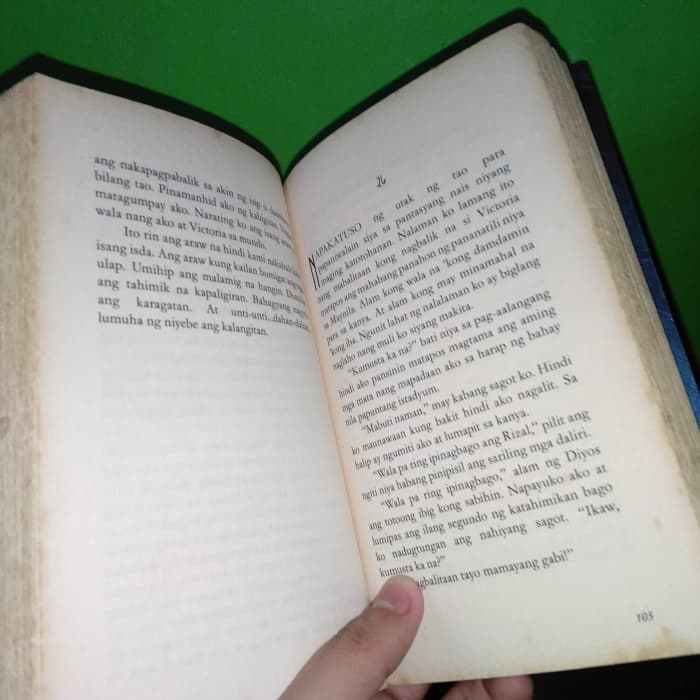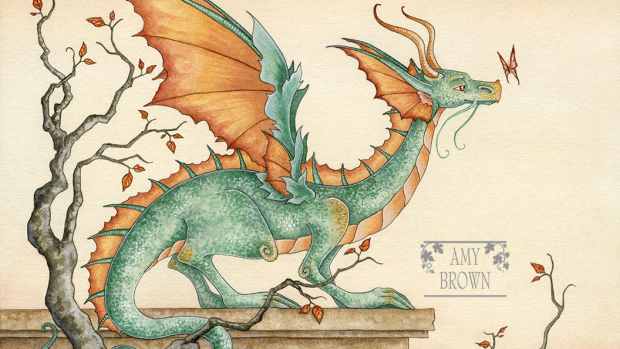Bob Ong's "Si": The Novel That Ends at Chapter Zero
"What is your name?"
"Victoria."
"When can I be with you?"
"At the moment of your birth."
— Si, Bob Ong
The Joys of Reading
What is a writer who doesn't know how to bask in the joys of reading?
I've always asked this question when the burning passion for writing engulfed me during my university days. Fundamentally idealized during my high school years, I have realized that I have always liked writing. But reading sways me in another direction. Not because I dislike doing it, and of course, not because I don't know how to read; but because I found it as a part missing within me, a blur or a fog that is yet to be cleared upon by a sense of enlightenment.
More and new books arrived indefinitely in my life, and I had to learn to not only read them but also find enjoyment in the said action. Nothing piqued my interest to its tip until I have somehow managed to muster the courage to finish the novel, seemingly blank and waiting to be imbursed in someone's imaginative mind, placed in between more of his books, within a shelf, inside a bookstore that I always visited. And of all my life enjoying to having already read several literary works, fiction, and nonfiction, until now, nothing has still stumped me more and hard than reading Bob Ong's 10th book "Si."
Encourage everyone you know to have at least one favorite book in their life. Because there is nothing more miserable than people who are literate but do not read.
— Bob Ong
The Phantom Writer
Who is Bob Ong?
Bob Ong is a pseudonym of a contemporary Filipino writer notoriously known for his culturally inclined, highly relatable conversational-like works that invoke humorous and reflective depictions of living in the Philippines. He doesn't identify his last name with a Filipino-Chinese descent, as he stated in his previous work "Stainless Longganisa." Several prolific Filipino writers accused of being Bob Ong respectfully decline the profile. It's not even his real name. He individually created the pseudonym from the name of his website. And the identity of the unknown author, who had sold millions of copies of his works nationwide, had never revealed himself in public. No one probably knew who he really is besides his close colleagues and himself.
The Background
Bob Ong started writing his works when he dropped out of college, publishing them using inspirations from his own personal experiences and the experiences of his acquaintances. He stated in an interview that his identity does not matter because it doesn't have anything to do with the works he had published, and he hoped to let himself be hidden from the public for as long as he can. Despite the anonymity surrounding his persona, his works tugged the hearts of a majority of the Filipinos that had read his works due to the books' culturally relatable stories and anecdotes. In fact, the novel "Si" had sold more than half a million during its distribution on a nationwide scale and is one of his most critically acclaimed works; the royalties from the sales of the book were entirely given to the author's initiatives and charities.
What is Si?
"Si" is a novel written by Bob Ong whom is known for his humorous and thought-provoking books. The book explores various themes such as love, relationships, self-discovery, and personal growth. "Si" delves into the complexities of human emotions and experiences through the eyes of its main character. Like Bob Ong's other works, "Si" combines wit, social commentary, and relatable storytelling to engage readers and provide insights into Filipino culture and society.
Solely written in the Filipino language, first published by the year 2013, and distributed by 2014, it is one of those books that left me wishing that it was translated into other languages for a greater variety of an audience to enjoy. I had wished that people outside (and inside) the country would just be as enamored as I am by its story, especially when I finished the book. And if it were to be finally translated, I wished that justice of translating it, from heart to soul, would be served. The profound poetic beauty and the sentimental depth of the Filipino language, or other languages otherwise, sometimes gets lost when it is changed and molded into another. And this sometimes affects the spirit and soul of not only the language used but also the source, losing their wonderful allure along the way.
"Si," on the surface, may look like a fairly randomly categorized piece of art due to its size, page count, quasi-non-linear structuring, and simplistic cover design. But there's more to it than what meets the eye; it upholds the true beauty of having quality over quantity.
The Book Begins Where It Ends
"Si" starts on chapter 72 with an unnamed man contemplating his happiness from being surrounded by his family and loved ones during his birthday. His sons and daughters were there celebrating with him, accompanying their respective partners, husbands, and wives. There are also his grandsons and his granddaughters. And of all that he is thankful for in his fulfilled life, the thing that he is most contented about is having his loving wife with him, Victoria. Through the thickest and thinnest, until death do they part.
We will notice that each chapter was written in a reverse-ish chronological order as we progress with his story, each chapter descending and anecdotally have been written only the most important events during the character's lifetime. It was purposefully made that way since each chapter represents the age of the main, unnamed protagonist. And as we continue to read the collections of important memories, we will soon come to terms that we've been sucked and immersed into its world without even realizing it, vaguely imagining the scenarios beautifully described in each word, questioning if the book itself is truly as fictional as it is or if it has been written by a true wordsmith that once existed in this planet.
They told how they attended weddings for their living sons and daughters, how they managed to build their family and home, how they suffered and grieved during the lost of some of their children, how they survived during seemingly cataclysmic events, and how they tried to help their peers and friends pursue their love, life, and careers.
They also told how they went against their parents and relatives when the members tried to keep them apart when they were young, and when they had an ad-hoc simple wedding during a regional cultural festival. They narrated the times when they had rarely seen each other again during their university years and the fluffiest, cutest story of how they met when they were clumsily, naively young.
Recommended
He remembered the chaos of the dictatorship era and the First People Power Revolution, the authoritarian brutality and impunity imposed by the government through police and military rule, and how he always feared having his family members being taken away or if they will kill his activist son.
He remembered the terror of the war when the Imperial Japanese came and terrorized their small rural countryside; he narrated the horrors and atrocities committed by the Imperial Japanese soldiers towards his fellowmen, and how he felt deeply sorry for his fellowmen falling to the ills of rebellion against the Imperial Japanese and against their own people. As such to his words, "woe to the people without unity, but even more miserable is the generation without a soul."
The unnamed man remembered everything as vividly and as realistic as he can: the happiness he felt from the warmth of love from his parents, how he was strictly raised by his parents and how he always wondered about their momentary aloofness. He remembered the goof and fun during his very young years, the days in elementary school and in church, and the mixtures of raw emotions that he hadn't understand until he had grown.
All of it, he remembered every special thing that happened to his life and narrated it through the book.
And of all the important and influential memories that he described, he eventually and gradually decided to keep only one thing in heart, soul, and mind: that is to have and share his pains, sorrows, hopes, dreams, and life with a woman named Victoria.
These are some of the most memorable moments within the novel, with multiple quotable proses within the narratives ringing as many truths until today. Of course, I won't be covering all of the details; these are just the tip of the iceberg. There's so much more into it, more for anyone to discover, to immerse into, to feel, and to uphold.
There's so much more.
Just a little bit. I will soon be born into a world where life will be experienced. Where I will love. And hurt. And will love again indefinitely. For the only glory of life is in love, and the sacred duty of the heart is to love, without fear of all the good that can be felt in spite of pains and mistakes. I want to love. And I want to love, be loved, and experience all the wonderful mysteries between the two.
— Si, Bob Ong
The Book Ends Where It Begins
The novel sort of paved the way for me to enjoy and read more books. It was a gateway I did not intend to enter but am quite happy anyway.
"Si" was Bob Ong's first book ever written in the pure romance genre, despite having multiple of it already established in anecdotes within his other conversational-like nonfiction books and story-structured fiction books. He wrote the book since he stated, in non-verbatim, that one should have the inspiration, the sacred will, to at least write something romantic during their lifetime.
The narrative may have glossed the first impression that it may be another generic book out there, one good at first but without any substance or something that has already been told. But for this case, it's not. It is a romance novel that heavily implied its story to revolve around the chronicles of love and life, of joys and sorrows, between the unnamed man and Victoria. It made me hungry for more content, so much so that I am eagerly tantalizingly to read his upcoming book.
There are parts within the book where the feelings of sorrow, joy, love, anger, laughter, conflict, suffering, and resolute were simply and profoundly felt; the things that make life beautiful, sublime, mundane, and complex. The novel also celebrated almost all variations of romance: from familial to platonic, from romantic to materialistic; from eros to agape, and from philia to pragma. And as much as it celebrated life, it enhanced the beauties and ugliness of life; the novel profoundly expounded on the subjective yet true meanings of unending sufferings and the eternal joys of life.
It can be a little funny at first to why the author decided to name the novel "Si." In fact, si in the Filipino language is a word used before naming a person. The title itself correlates on why the unnamed protagonist is unnamed in the first place, and why the focus of book's point of view is majorly only to the point of view of the main character. It may not even more surprising if anyone finally wondered why it's the chosen title for the book once they finished reading it.
It will hook you from the start, following a story of an unnamed man, without ever realizing why he was unnamed in the first place. And when you have finally reached the end, you'll have tears forming in your eyes as the sudden realizations come crashing down, slowly, and ever so powerful than the last; it'll never fail to leave you bawling, even if you have already established belief systems that may or may not contradict it being controversy.
I won't be going in-depth on what the ending means; I want you to read and learn the beauty and the sorrow of it all. It's one of those books where the pitch of the ball was too perfect for the batter to hit, resulting in a wondrous homerun. And if you haven't read it already, give it a fair shot. Read it from beginning to end. Just always remember that the novel truly, canonically ends at chapter zero.
Further Reading
- Bakunawa: The Tale of a Dragon and Seven Moons
The Bakunawa is a dragon in Philippine mythology that is often represented as a gigantic sea serpent. It is believed to be the cause of eclipses. - Baybayin: Learning a Writing System From the Philippines
Google Keyboard added Baybayin to their featured languages. I'm going to show you how to start to write and read Baybayin — one of the most prominent writing systems in the Philippines. - Dr. Jose Rizal's "The Social Cancer" and "Reign of Greed"
"Noli Me Tangere" and "El Filibisterismo" are two of Dr. Jose Rizal's many literary masterpieces that spoke about nationalism, patiotism, rights, justice, and freedom. - The Fascinating World of Filipino Shamans and Witchcraft
Witches, shamans, faith healers, and sorcerers were once common in the Philippines. Learn more about these figures and the occult practices that continue today.
© 2021 Darius Razzle Paciente

















